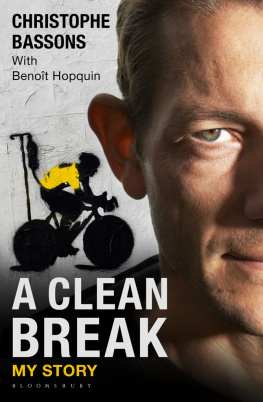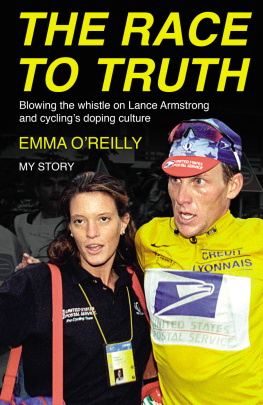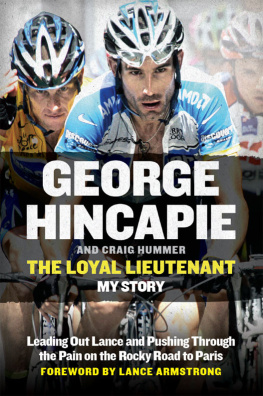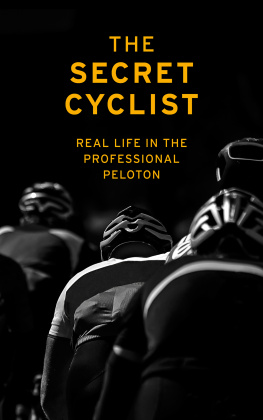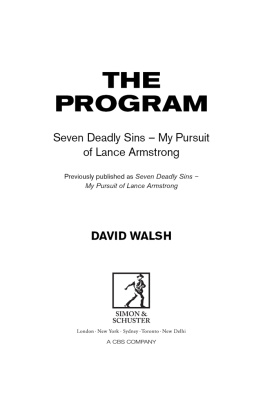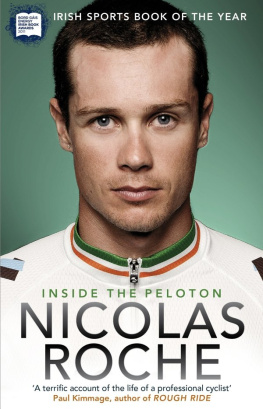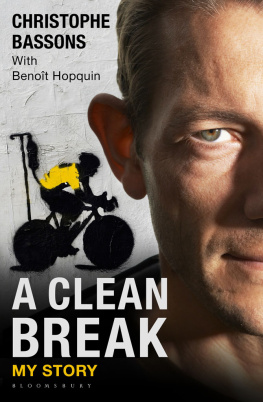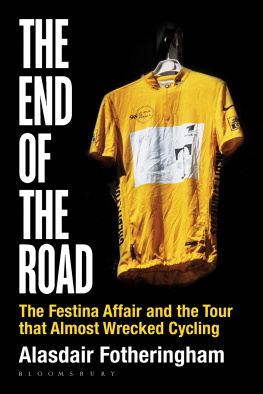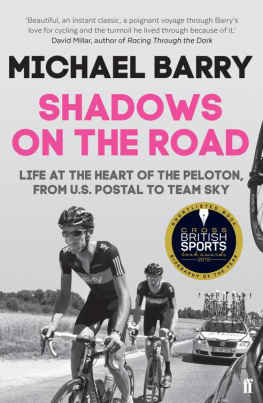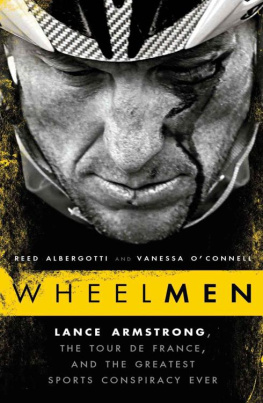
I remained silent for a long time. I pedalled without saying a word. I shut myself away in the peloton and kept my counsel. For almost three years, all that came from me were sighs when the climbs got steep, my legs got tight, my rivals were pitiless and my breathing got laboured. I stoically endured all the excesses of the cycling world that I so wanted to be part of. Initially, when my nose was all but pinned to my bars because of that effort, I didnt see anything. Then I pretended I couldnt see anything. I held my words back. I needed every little bit of breath I could muster to stay with the multi-coloured convoy as it sped along the roads. I did notice it getting faster and faster, even when those policing the sport claimed that it had been slowed down.
I even felt happy to be experiencing this wild adventure. The whirr of bearings lulled my thinking. I heard chains clicking up and down the gears and thought I could detect the magical hymn of the so-called convicts of the road, of whom I was a proud member. I didnt realise that it was actually the muted murmuring of a prison, masking the cries for help emanating from the deepest of dungeons. The wind that whistled in my ears gave me the feeling of freedom. These familiar sounds hid my doubts in those moments when I wasnt simply too exhausted to have them.
I cried a lot during those long months. I cried in pain on the bike and then with impotent rage beyond the finish line, or at least on those occasions when I didnt abandon beforehand. I reasoned that suffering gives cycling its nobility. My tears were providing sustenance for its legends, preventing them from withering away. Come on, kid! Forget the arrows that pierce your legs every time you stand on the pedals. Take a look around you! Everyone else must be going through the same torture and yet they are not letting it show. They are braver than you. Look at these impassive faces. Theyve not even got their mouths open, even when on the toughest gradients. Theyre not grimacing at all. Admire their ability to control their suffering even in adversity. How do they do it? They must be working harder than you, you slacker!
I flogged myself. I increased my training load. I sweated even more on my favourite roads in the Tarn, telling myself that the water seeping out of my pores couldnt now flow as tears from my eyes.
To be honest, it was this that really bothered me: not only were the other riders not crying on their bikes, but they werent sweating either. They were still dry at the finish, bone dry in fact, while my jersey was drenched.
I didnt know that giving every little bit of sweat was not enough. You also needed to give blood.
I didnt say anything when I finally grasped the extent of the fraud. I had known about doping since I first started to race. As an amateur, I didnt really believe what was being said about it. It seemed abstract, overrated, nothing less than cheating. After turning professional, I discovered how effective these potions were. Above all, I learned how the corrupt use of medical products had become inextricably linked not just to achieving great success, but even to everyday riding.
Cyclists are always ready to trot out the same expression: faire le mtier doing the job. I thought that this principle signified a rider devoting himself entirely to his career, by training with complete commitment, following a strict diet, and maintaining a disciplined lifestyle. This was certainly how I applied myself, being what I thought was a complete professional. I thought I was doing the job correctly, but I was told I wasnt. I was mistaken about the meaning of this precept. As it stands, the phrase is a huge understatement and also quite hypocritical. It would be far more accurate if it said: Do anything and everything for the job. Or, better still: Flog yourself into the ground for the job.
I wasnt ready to do all that was required. I accepted the need to rein in my appetite, to berate myself for any indolence, and to lead a nomadic existence, torturing my body for half of the year on the road. But I refused to surrender my honesty, to sacrifice my health on the altar of victory. During those years of anonymity, that was where I fell short as a cyclist, but it was what made me proud as a man.
My rejection of absolutely everything the job entailed went well beyond simple concern about putting a needle in my arm and the poison that it would pump into my veins. Ive never been capable of cheating in order to win. I use the word capable purposely because of my complete inability in this regard. Its not simply a matter of choice. My education and upbringing and also my bad temper, my hopeless tendency towards contradiction and my fanatical individualism created a barrier that made me impervious to any temptations. To use a medical analogy, these characteristics created antibodies that have protected me. This in-built antidote allowed me to stick to my categorical refusal, while others, who are no worse than me as characters, simply could not hold out any longer. Im not a hero, just someone incapable of yielding, who is constrained by certain taboos and a certain concept of victory, sport and life in general.
At that time, I didnt say anything. I didnt feel the need to. I was sure I was going to succeed without needing to resort to subterfuge. I believed I had enough ability to take me to the very top. I didnt need a chemical crutch. I was just into my twenties, an age when you feel heroic. I thought I was in one of those trashy novels where the main character overcomes heavily armed adversaries with his fists alone. Virtue always triumphs. Children rejoice, women swoon, men laud their saviour, while the hint of a smile can be seen on the face of the Herculean hero as the baddies lay scattered all around. I could see myself in exactly that role, with a healthy glint in my eye and my arms full of flowers, saying: I am happy to have won. I hope to do as well next time.
But the great history of cycling is not that kind of swashbuckling tale. I had to submit to a fate that Id thought I could brush aside as easily as I could my opponents. Without doping, I couldnt achieve anything, or at least not very much. Having initially failed to finish races, I then managed to do so, but was utterly defeated. The hardest thing to take was those races where I performed well. I came away from them full of regret. The incentive to succumb to temptation was strong and never-ending, like a huge press slowly crushing the toughest metals until they are in the required shape. Being part of such an insidious set-up made me question convictions that I thought were deeply rooted and inseparable from my being. Doping myself would have meant disowning myself. And yet I did almost betray myself. I wavered. I had injections, three or four times. I injected myself with water and glucose. On another occasion, I was tempted to take a shot of caffeine. The needle missed my vein. But what did it matter? I tried to do it, even though the jab missed its target. I saw this willingness to take supplements as a betrayal and, above all, as a potential first step on a very slippery slope, even though the products concerned were harmless.
I was on the verge of complete collapse, but love arrived just in time. I met Pascale. She became part of my struggle, and everything became easier with two of us on board. She released me from the morbid isolation into which I was sinking. She found the right words when they needed to be said. When I was demoralised, her support was a wonderful balm. She shored up my resolve, even when it was shaken to its foundations.
So I was able to hold out. I remained uncompromising but, I admit, mute. The same arrogance that enabled me to cling on to the ideal of riding clean prevented me from condemning loud and clear the little tricks and big scams within the sport. I was engaged in a personal battle. Thanks to some heightened feeling of distress, I believed that I was the only one interested in this issue. For the public, at that time, doping was a dim shadow cast across cycling, but one which in no way tarnished the vivid colours of the riders they cheered on from the roadsides. Spectators used to say, Their sport is so hard, and offered absolution along with applause. Worse still, fans would say, They are all doped, which was intellectually convenient. This prejudice enabled fans to let their champions off lightly and celebrate their victories without restraint. The idea that there might be guys among the also-rans who were trying to compete despite a considerable handicap would have spoiled their fun. Forget about the outsider who refused to go with the flow: that was his problem. Dont bother us with thoughts of these wet blankets and, above all, dont do anything to undermine our childlike happiness.
Next page
